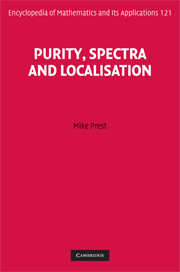Part II - Functors
Published online by Cambridge University Press: 05 March 2013
Summary
Context Our attention so far has been centred on categories of modules, though much use has been made of “functorial” techniques. This part begins with an exposition of the general background for, and then the details of, these methods. Henceforth we will work much of the time in categories of functors and localisations of these. We begin with a chapter which introduces additive functor categories; we take the view that functors are just generalised modules and can largely be understood as such. That is followed by a chapter on torsion-theoretic localisation of categories. In our context this is the functorial analogue of restricting to a closed subset of the Ziegler spectrum, equivalently of restricting to a definable subcategory.
Having made the effort to step into this more abstract world, we can increase the reward by widening the applicability of the results that we prove. For, there are many categories of structures other than categories of modules to which the results of Part I apply. Examples include categories of presheaves and sheaves of modules, many subcategories of categories of modules (for a familiar example, the category of torsion abelian groups), categories of comodules, functor categories themselves. Therefore, instead of starting with the category of modules over a ring, from the outset we work in a more general context. But there is no harm in sticking with the modules case if one wishes to do so and I have tried to write this part in a way that allows the reader to ignore the extra generality if he or she so desires.
- Type
- Chapter
- Information
- Purity, Spectra and Localisation , pp. 417 - 418Publisher: Cambridge University PressPrint publication year: 2009

